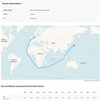BIO Responds to Navy's 'Green Fleet' Criticisms
Biotechnology Industry Organization (BIO) supports Navy's demonstration of advanced biofuels during RIMPAC maneuvers
Brent Erickson, executive vice president of the Biotechnology Industry Organization’s (BIO) Industrial & Environmental Section, made the following remarks to confirm his organization's position:
“The criticisms of the Navy’s upcoming demonstration of advanced biofuels leveled by the oil refinery industry have no real merit. Petroleum refinery industry groups are seeking solely to prevent the emergence of competitors within their highly protected and favored markets.”
“Achieving energy security is critical to national security and military readiness, and the domestic advanced biofuel industry is attempting to do its part to help the U.S. military reach its goals. It is clear that our military cannot achieve energy security by continuing to depend on foreign oil. Liquid fuels are needed to fly planes and sail ships, so biofuels are critical components of military energy security.
“U.S. taxpayers spend $80 billion each year for the U.S. military to defend international oil shipping lanes in the Persian Gulf and elsewhere. At the same time, the United States is importing nearly 2 million barrels of oil from the Persian Gulf each and every day. U.S. consumers are essentially paying twice for each barrel of our continued dependence on foreign oil.
“The U.S. military has experienced as much pain at the pump in recent years as every other U.S. consumer, due to the increasing volatility of oil prices. The Department of Defense spent $17.3 billion on petroleum in 2011, a 26 percent increase from the previous year with practically no change in the volume purchased. In the past year, the $30 increase in oil prices resulted in more than $3 billion in additional, unplanned costs for the DoD.
“Access to fuel is only one aspect of energy security. The United States must achieve some measure of control over the affordability of fuel supplies. No matter how much oil is produced in the United States and by our neighbors and allies, OPEC will continue to set world oil prices and exercise control over the affordability of fuel. Do we really want to wait until the price of petroleum fuels has reached $26 per gallon to begin to look for alternatives?"










